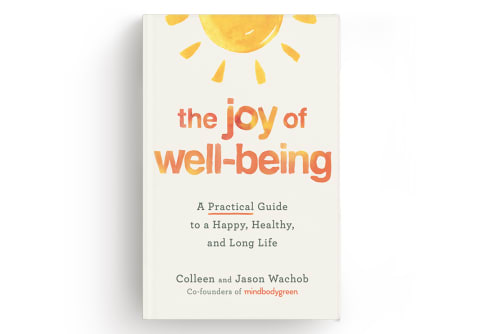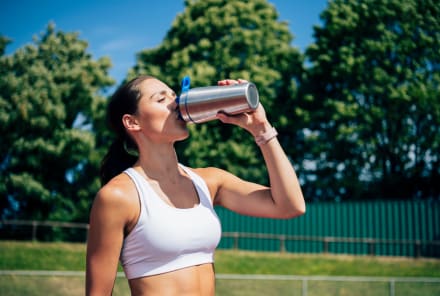Advertisement
Forget Complicated Food Rules: This Is The Most Important One Hands Down


Whole foods. Plant-based food. Organic food. Processed food. All natural food. Local food. There are endless qualifiers for "food" in the nutrition world; some are straightforward, and others are just the marketing equivalent of jazz hands. Regardless, it can all get pretty confusing pretty fast, so we'll try to keep it simple.
- Eat real food.
- Eat real food.
- Eat real food!
What does that mean? Real food is food that is in its original form or is as close to that as humanly possible. These are foods that are not processed, are rich in nutrients, and are free of additives.
Think blackberries, avocados, arugula, broccoli, walnuts, garlic, sweet potatoes, grass-fed beef, wild salmon, or pasture-raised eggs from your neighbor's chickens (eat those chickens too, if on offer).
Whole fruits and veggies are the first things that spring to mind when we talk about real food because they are most recognizably in their natural form. Things get a little trickier when you move on down the line to grains, meat, and dairy, all of which can show up on the grocery store shelf either minimally processed or highly processed.
But for those of us who are able to eat a diet of primarily real food, the benefits abound. For starters, you'll benefit from lower rates of Type 2 diabetes1, heart disease2, and cancer.3 You will be eating a diet rich in antioxidants and micronutrients like vitamins and minerals. You'll be feeding your gut microbiome the fiber it needs to digest properly, maintain immune health, and keep your blood sugar in check. You will starve the plaque-causing bacteria that live in your mouth and explode your budget with dental bills. And once you get on the real-food train, you'll benefit from fewer cravings for sugar and highly processed food.
For years now, we have all heard the news that processed foods are bad for us
Things like high-fructose corn syrup and trans fats are two highly publicized examples. When we think of highly processed foods, we think of McDonald's, KFC, or food you might buy at the gas station. But do most people think about yogurt, pasta, or even oatmeal as being processed?
But as real-food visionary and endocrinologist Robert Lustig, M.D., says, "It's not what's in the food—it's what's been done to the food that counts." In other words, people get a little too hung up on whether it's sugar or fat or salt that we should be avoiding in our food and forget to look at the other dimensions of what's on our plate.
For instance, depending on which brand you happen to snag at the store, your yogurt might not be just cow's milk fermented with some good-for-your-gut microbes—it could also include fat replacements and "natural flavors" that are just chemicals designed to smell like the real fruit they have neglected to actually include in that "blueberry" yogurt. Artificial sweeteners are everywhere, and some like aspartame are associated with a greater risk of cancer4. So we have starches, gums, thickeners, and sugars going in, and fiber, fat, and micronutrients coming out, and often we have no idea what the wizard is doing behind the curtain to make it all happen.
Trying to decode a food label at the grocery store has never been a more mystifying endeavor
Many of these highly processed foods can even be labeled organic because you don't need pesticides to develop compounds in a lab. Likewise, many of these chemical additives are derived from plants, which gives the food industry legal cover to call them "natural." Even more alarming, as the term plant-based has gained popularity, brands are scrambling to put that qualifier on everything from crackers to fake meat.
As savvy as we are about nutrition after all these years, even we have gotten caught in marketing booby traps laid for us by the food executives. For instance, fake fats are notoriously hard to spot. There is an array of fake fats added to foods that are patented under names like Simplesse but stealthily hidden on your food label as "milk protein." When you read "milk protein," it sounds pretty wholesome, a lot like real food, right? It's not, but that's the whole point of the wordplay. In the end, all the linguistic trickery explains how Greek yogurt could contain no fat, no added sugar, and no real fruit and not taste like total garbage.
Processed food is too good to be true
In the mid-20th century, when we began to process our food supply in earnest, we started down a dangerous path.
We began a long, expensive, disastrous experiment with our food that included tinkering, adding, subtracting, and shuffling around key components of whole foods. Whether it's genetically modifying food or enriching it, we have fundamentally changed the food supply, and as a result, the food supply has changed us. As U.S. corporations were experimenting with how to make food more profitable and palatable and easier to produce, they were also playing with our long-term health by testing the impacts of their new inventions only on our short-term health. If they tested a new modified starch on a bunch of rats and they didn't immediately die (or die within six weeks), that was considered good enough. But no one studied the long-term metabolic effects of all this tinkering with the food supply.
The belief was (and still is in some places) that if the additives that you put in are safe, then changing the chemical composition of the food as a whole must be safe too. The argument goes that our bodies don't care if we have yogurt with artificial sweetener that is technically nontoxic.
Your metabolism is nobody’s fool, but if you treat it like one, you will see a range of unintended downstream health consequences.
In fact, it's good for us from a calories‑in, calories-out perspective—what our body doesn't know won't hurt it, right? Unfortunately, that couldn't be more wrong. It matters where our calories come from. The fundamental miscalculation that the U.S. made in the 1940s when it decided to start enriching food is the same one we make today when we continue to eat those highly processed foods. We underestimate the profound complexity and intelligence of the human body. Your metabolism is nobody's fool, but if you treat it like one, you will see a range of unintended downstream health consequences.
There is so much we don't know about the impact of all the additives we are putting in our food. The food industrial complex is not interested in funding that kind of research, and the amount of research scientists can do is far outstripped by the breakneck speed of food technology. But what we do know is more than enough to have you shopping the perimeter of the grocery store forever.
Excerpted from The Joy of Well-Being by Colleen Wachob and Jason Wachob. Copyright © 2023 by Colleen Wachob and Jason Wachob. Reprinted with permission of Balance Publishing, an imprint of Hachette Book Group. All rights reserved.
Watch Next
Enjoy some of our favorite clips from classes
Enjoy some of our favorite clips from classes
What Is Meditation?
Mindfulness/Spirituality | Light Watkins
Box Breathing
Mindfulness/Spirituality | Gwen Dittmar
What Breathwork Can Address
Mindfulness/Spirituality | Gwen Dittmar
The 8 Limbs of Yoga - What is Asana?
Yoga | Caley Alyssa
Two Standing Postures to Open Up Tight Hips
Yoga | Caley Alyssa
How Plants Can Optimize Athletic Performance
Nutrition | Rich Roll
What to Eat Before a Workout
Nutrition | Rich Roll
How Ayurveda Helps Us Navigate Modern Life
Nutrition | Sahara Rose
Messages About Love & Relationships
Love & Relationships | Esther Perel
Love Languages
Love & Relationships | Esther Perel












